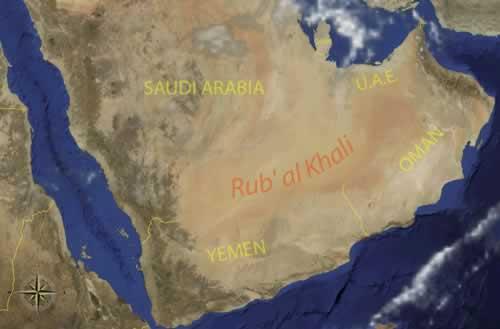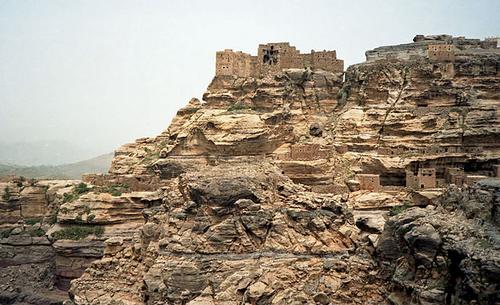YEMEN
Geography and Landscape

Geography and Landscape
| Basic information | |
| Official language | Arabic |
| Capital | Sanaa |
| Area | 527.968 km² |
| Population | 30,924,887 (2021) |
| Currency | Yemeni rial (YER) |
| Web | .ye |
| Code. | YAR |
| Tel. | +957 |
Geography and Landscape
Geography
Yemen is located in the Middle East. Yemen borders the Arabian Sea, the Gulf of Aden and the Red Sea. It lies between Saudi Arabia and Oman. The surface area of Yemen is 527,970 square kilometres.

Landscape
Along the coast is a small strip of land called the Tihama, which is bordered on the west by the highest mountains in the country. These mountains are over three thousand metres high and descend into a very fertile plateau. In this high area, you can still find active volcanoes and hot springs. The great Arabian desert enters the country in the north and continues to the south coast. Two thirds of Yemen is uninhabited.
There is a great variety of landscapes. The Tihama, is a desert-like plain of twenty by fifty kilometres. The capital Sana'a lies at an altitude of 2250 metres, surrounded by mountains with active volcanoes and geysers. To the east, the mountain range decreases and, at an altitude of 1,000 metres, the Arabian desert begins.
 Landscape near Kawkaban YemenPhoto: Bernard Gagnon CC 3.0 Unported no changes made
Landscape near Kawkaban YemenPhoto: Bernard Gagnon CC 3.0 Unported no changes made
Climate and Weather
Yemen has a predominantly desert climate, but there is great regional variation due to differences in altitude. On the coast and in the west, the temperature is between 20 and 48 degrees and there is little rain. In the mountains, the daytime temperature is 20 to 25 degrees, but in the winter months it can freeze at night. Rain falls here during the monsoon months in March-April and in summer.
Plants and Animals
Plants
Along the Tihama, the flora varies from mangroves to grass and shrub plains. More rain falls at the foot of the mountains. Acacias and palms grow there. High up in the mountains, tropical plants grow. There are also tropical fruit plantations. On the highest mountain ridges, you will find coffee and qat fields (the national drug). On the plateau grow sorghum millet, vegetables and spices. Furthermore, date palm, eucalyptus, juniper, tamarind, tamarisk and fig grow there.
Animals
In the desert areas, the camel is the most common animal. In the mountain areas, goats, sheep, rodents and snakes live. Other wild animals include the monkey, civet cat, hare, hyena, oryx, ibex and porcupine.
Sources
Elmar Landeninformatie
CIA - World Factbook
BBC - Country Profiles
Copyright: Team The World of Info